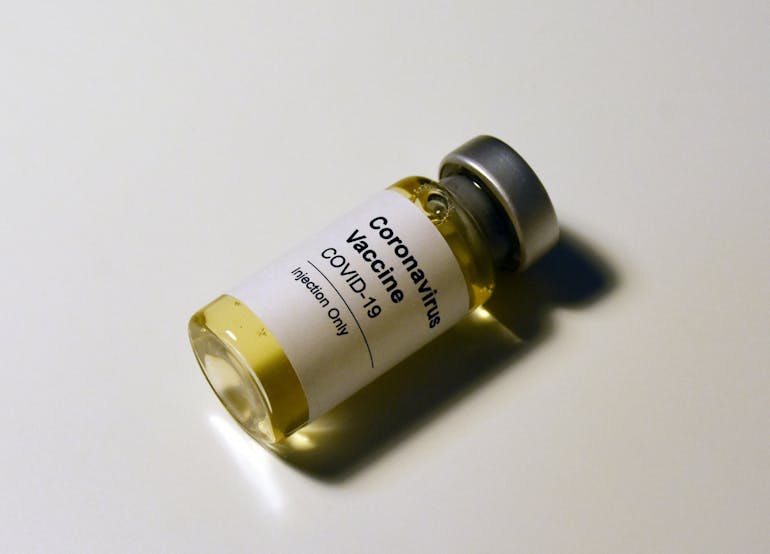Coronavirus vaccine guide: FAQs and NHS information
Reviewed and fact-checked by Giulia Guerrini, Superintendent Pharmacist. Read our editorial policy to see how we create informative, accurate content.
Have any questions about who can get the vaccine, how safe the COVID-19 vaccine is or its side effects? Read our guide below, and find out more information at the official NHS COVID-19 vaccine page.
Please note: we don't offer the COVID-19 vaccine, and can't book appointments for you. This is an informational guide only, so you have all the updates you need.
What is the COVID-19 vaccine?
The COVID-19 vaccine gives you safe and effective protection against coronavirus. The coronavirus vaccine is given as an injection into your upper arm, in two doses. You’ll have the 2nd dose 3 to 12 weeks after having the 1st dose.
The approved COVID-19 vaccines don’t contain any animal products or egg.
Who can get the COVID-19 vaccine?
Eventually, everyone! But currently, the NHS is offering the COVID-19 vaccine to people who are most at risk:
- people aged 80 and over
- some people aged 70 and over
- some people who are clinically extremely vulnerable
- people who live or work in care homes
- health and social care workers
How to book my COVID-19 vaccine?
Remember: you won’t have to contact the NHS to find out if you can get a vaccine. Letters are being sent out every week, and you’ll be let know straight away if it’s your turn. If you’ve been sent a letter, you can book your vaccination appointments online.
Where can I get the coronavirus vaccine?
Centres are being opened all the time to make sure everyone can get vaccinated. In England, the vaccine is being offered in some hospitals and pharmacies, at local vaccination centres run by GPs and at larger vaccination centres.
Is the COVID-19 vaccine safe?
Yes. The coronavirus vaccines approved for use in the UK have met strict standards of safety, quality and effectiveness set out by the independent Medicines and Healthcare products Regulatory Agency (MHRA).
Any coronavirus vaccine that is approved must go through all the clinical trials and safety checks all other licensed medicines go through. When other vaccines are developed, they will only be available if they have been thoroughly tested. So far, thousands of people have been given the vaccine safely. Reports of serious side effects, such as allergic reactions, have been very rare. No long-term complications have been reported.
How effective is the COVID-19 vaccine?
After the first dose of the coronavirus vaccine, you’ll have good protection against COVID-19 – but you need the second dose for long-lasting protection. Even if you’ve had the vaccine, there’s still a chance you might get or spread coronavirus. Make sure keep following social distancing guidelines and wear a mask in public.
What are the coronavirus vaccine side effects? What about allergies?
You may get some side effects, including:
- a sore arm where the needle went in
- feeling tired
- a headache
- feeling achy
- feeling or being sick
Most side effects are mild and shouldn’t last longer than a week. If you’re feeling these effects, we’d recommend taking a pain reliever such as paracetamol if you need to. If you feel worse or you’re worried, call 111.
If you’ve ever had a serious allergic reaction to something before, tell healthcare staff before you get vaccinated. You shouldn’t have the COVID-19 vaccine if you’ve ever had a serious reaction to a previous dose of the same vaccine, or any of the ingredients in the vaccine.
Can I get the COVID-19 vaccine if I’m pregnant or breastfeeding?
While there’s no evidence that the COVID-19 vaccine is unsafe if you’re pregnant, the NHS needs more data before you can be routinely offered the vaccine during pregnancy.
Speak to your doctor to make sure. At the minute, you may be able to have the vaccine if you're pregnant and:
- at high risk of getting coronavirus because of where you work
- have a health condition that means you're at high risk of serious complications of coronavirus
If you’re breastfeeding, you can have the COVID-19 vaccination safely. And if you’re looking to get pregnant after having the vaccination, don’t worry: the vaccine can’t give your or your baby COVID.
Still have questions? We’ll update this page whenever we have any more information. In the meantime, visit the NHS COVID-19 advice hub or speak to your doctor.

